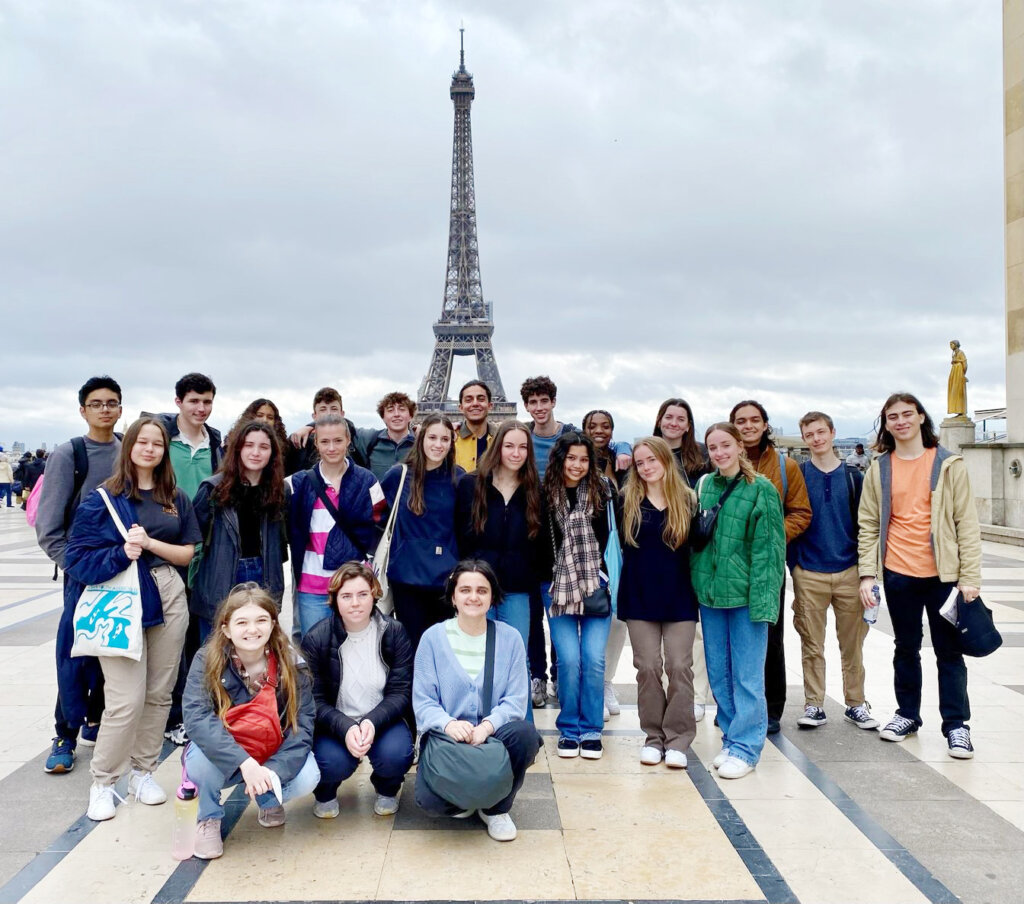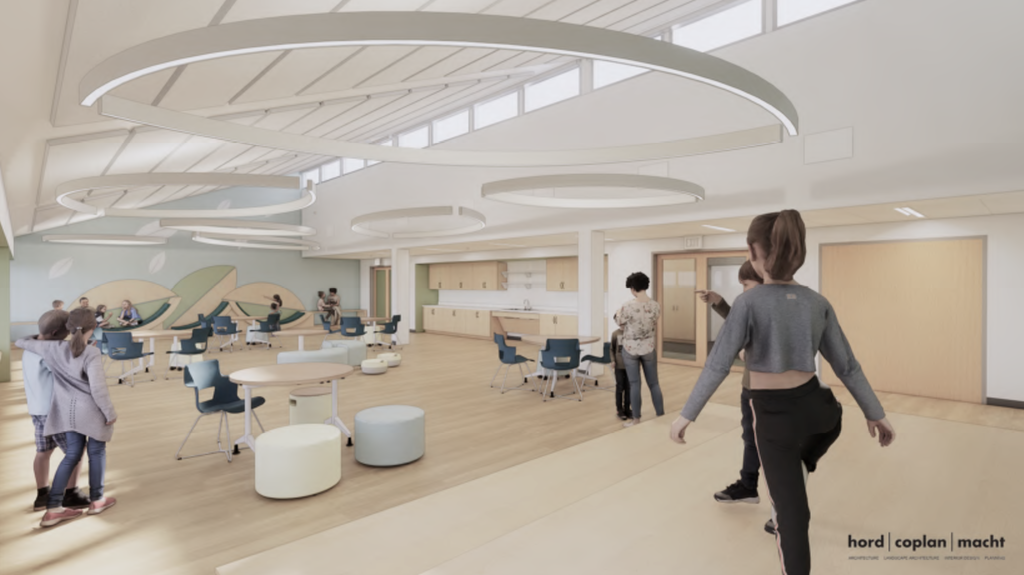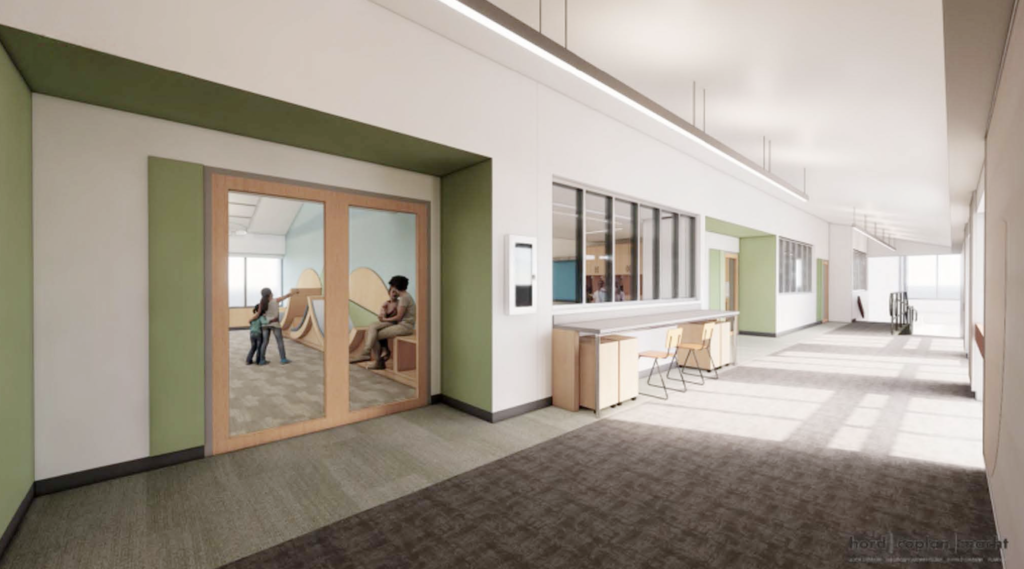Science and Computer Science
The primary goal of the science department is to engage and challenge our students with the hope of producing thoughtful citizens who have the ability, confidence, and enthusiasm to inquire about the natural world.
The science department supports these goals by promoting a durable understanding of the world through the study of chemical, biological, physical, engineering, and computer science principles. Rather than seeing each of these as separate disciplines, we encourage students to grapple with their interaction and mutual influence.
In our classrooms, we emphasize processes of inquiry and thoughtful analysis over rote recitation. We help students learn to question what they observe, to look for evidence for and against a particular viewpoint, and to design tests to collect data to develop increasingly sophisticated models. This emphasis on scientific process and creative problem solving encourages an open-minded and rigorous independence of thought that students then bring to bear on the world around them.
The science department feels strongly that students should have the opportunity to pursue advanced work in the major disciplines. We feel that this is best accomplished by a rich elective program with curricula designed to meet the interests and passions of students.
Requirements
Two year-long courses, Core 9 (Physics, Engineering, and Computer Science), and Core 10 (Chemistry and Biology) are required for graduation.
Core 9: Physics, Engineering, and Computer Science
Grade 9 • Required
This is the first of two foundational courses in Park’s science program. Using an integrated approach, the course examines a careful selection of topics that govern the physical world such as kinematics and electricity, as well as engineering and computer science concepts that dictate the designed world. Integrations of these disciplines consist of utilizing physics as a context for engineering and computer science projects while incorporating computer and engineering skills and models to better understand physics. These concepts will be grounded in hands-on culminating experiences and projects. Throughout the year, the course provides a substantial foundation in laboratory skills with an emphasis on experimentation, design, modeling, and data analysis. Writing is also central to the course, as students learn to form a cohesive argument using both experimental data and scientific theory as support.
Core 10: Chemistry and Biology
Grade 10 • Required • Prerequisite: Core 9
Core 10 is the second of two foundational courses in Park’s science program. This integrated course covers key biological principles, such as ecology, evolution, genetics, and the environment, by grounding them in chemical concepts such as molecular structure and function, solubility, rates of reactions, and equilibrium. The foundational laboratory skills practiced in Core 9 will be expanded upon in Core 10 with an emphasis on original research and statistical significance. The course includes student-driven experimentation both in the lab and outside in Park’s extensive campus. The writing component will include exposure to primary sources of literature to support experimental findings. Throughout the year, this course will offer differentiated levels of challenge; accelerated credit is possible for students who routinely select and achieve the highest level of challenge and rigor.
Physics 2: Mechanics with Calculus (Accelerated)
Grades 10-12 • Prerequisite: Core 9 and Calculus (Accelerated).
This is a physics class designed to challenge students with a rigorous and in-depth study of the fundamental concepts of mechanics. Topics covered include kinematics, Newton’s laws of motion, work, energy, momentum, rotational motion, and gravity. This course will require hands-on lab work, independent problem-solving, and critical thinking in order to apply concepts to real-world examples and solve complex problems. Assessments will take the form of lab reports, problem sets, presentations, and tests. All students will walk away with a deeper understanding and appreciation of the physical universe as well as with a solid foundation for college-level science classes.
Biology 2: Agricultural Research
Grades: 11-12 • Prerequisite: Core 10
In Agriculture, students will consider the good, bad, and ugly of our food supply system. Agriculture is a science that values the environment, cares about the health of plants, animals, and people, and functions on tight profit margins. Expect to learn about the most common crops and livestock farmed in Maryland through interactions with farmers, farm equipment, and emerging technologies. Small or large, diverse or monocrop, young or old, all farms have different challenges and different strengths. With an aging farmer demographic, knowledge, appreciation, and advocacy for farms as a consumer or as a future farmer all contribute to giving farming and farmers the respect and resources they deserve. Students will engage fully with not only plants, but also food animals and should be prepared to evaluate their relationship with their food.
Biology 2: Ecology and Biology 2: Ecology (Accelerated)
Grades: 11-12 • Prerequisite or corequisite: Core 10. Permission of the department is required for accelerated credit.
The natural world is all around us, but we often don’t have a well-developed appreciation for how natural systems work and function. Ecology is the study of the interactions between organisms and their environment, and we will begin the course by looking deeply into the underlying ecological processes that drive the natural world. Particular emphasis will be paid to population, community, and ecosystem level processes. Students will be exposed to ecology both in theory and practice, through lectures, readings, discussions, and various field trips and activities both in our woods and other local environments. Additionally, the concept of global change will be a constant thread throughout the course. As the footprint of human activities on ecological systems continues to expand, it is critical to understand how humans have been drivers of ecological change on multiple scales. The skills this course focuses on include field research and lab research, documentation in a lab notebook, and a heavy component of experimental design. In addition, scientific reading and writing will be required. The accelerated version of this course will assume more comfort with a faster pace while learning detail-heavy information. It will also be reading and writing intensive.
Biology 2: Genetics and Biology 2: Genetics (Accelerated)
Grades: 11-12 • Prerequisite: Core 9 and/or permission of the department.
Starting with a single cell, students will study cell division and learn how genes both control and monitor growth and development. Then they will learn classical Mendelian genetics with Punnett Squares and pedigrees before moving on to modern molecular genetics. Modern molecular genetics includes transcription, translation, and post-translational modification as well as non-Mendelian mechanisms for inheritance. Throughout the course, students will develop and hone the lab skills essential to modern day study of cells and development. Specific genes related to animal and plant health and disease will be highlighted throughout the course. The accelerated version of this course will assume more comfort with a faster pace while learning detail-heavy information. It will also be reading and writing intensive.
Chemistry 2: Biochemistry
Grades: 11-12 • Prerequisite: Core 10
Biochemistry is the water-based chemistry that occurs by biologic systems to allow organisms to survive, function, and grow. Students will learn how organisms use metabolism to break down food into molecules and how those molecules are used to grow cells. How do cells extract energy from sugar molecules? How do cells make the proteins used for metabolism and growth? By answering questions like these, the class will cover the basics of catabolism and anabolism at the cellular level. The course will eventually culminate into a unit on the Foundations of Hair, Skin, and Nails. How do our bodies make these macromolecules? What are the cellular factors that make hair, skin, and nails grow strong and what can cause them to be damaged? How can we know when these biological structures are “healthy” or not? How do cosmetics use and other actions taken in the name of “beauty” influence the health of our cells? Students will have the opportunity to fuse science with the humanities through journaling, photography, film-making, or taking a tour through the history of not only the products themselves, but also the cultural shifts in society’s views on hair, skin, and nails.
Chemistry 2: Molectural Gastronomy
Grades 11-12 • Prerequisite: Core 10
This course will cover the biology and chemistry of food and cooking, from the fundamental molecules of food to the thickening of sauces to the starch molecules in bread. Students will delve into the science behind why foods behave certain ways — what happens when they knead bread dough or how whipped cream turns into butter. This is not a cooking class, but rather one based on fundamental principles, and any eating of our products will be for the purposes of scientific observation. This course will be heavily lab-based and may require some cooking to be done outside of class.
Chemistry 2: Thermodynamics and Chemistry 2: Thermodynamics (Accelerated)
Grades 11-12 • Prerequisite: Core 10 and permission of the department is required to take the accelerated class.
All around us, the energy of chemical reactions is used to do work; from driving your car to school to powering the cells in your body, life is taking advantage of the energy released by chemical reactions. This course explores the relationship between chemical reactions, heat, and work. Some of the questions students will consider include, where does the energy of chemical reactions come from? How much energy from a chemical reaction is available to do work? How do we drive a process that is not spontaneous by coupling it with ones that are? Why are some chemical reactions so violent and how can we control explosive reactions? Topics covered include stoichiometry, bond energy, enthalpy, entropy, and Gibbs free energy, along with their applications to redox reactions, kinetics, solubility, and equilibrium. This class was previously listed as Explosive Chemistry. The accelerated version of the course is fast-paced, reading and writing intensive, and equires algebra facility and independent lab work.
Computer Science 2: Python (Accelerated)
Grades: 10-12 • Prerequisite: Core 9 and/or permission of the department.
This fast-paced course is an introduction to the Python programming language, a relatively easy language to learn, that provides the basic conceptual underpinnings of the important ideas in computer science. Students spend the first half of the class expanding on the concepts they learned about in Core 9: loops, arrays, string and number manipulation, and functions. In the second half of the course, students begin exploring more advanced issues in computer science, including graphical interfaces, recursion, object-oriented programming, data structures, and runtime complexity.
Engineering 2: Electrical Engineering
Grades: 10-12 • Core 10 and permission of the department.
From smartphones to appliances, digital circuits are all around us. This course provides a foundation for students who are interested in electrical engineering, electronics, or circuit design. Students study topics such as combinational and sequential logic and are exposed to circuit design tools used in industry, including logic gates, integrated circuits, and programmable logic devices. Students will develop key engineering skills including teamwork, communication methods, and technical documentation. Students will analyze, design, and build digital electronic circuits. While implementing these designs, students will continually hone their professional skills, creative abilities, and understanding of the circuit design process. The class will be expected to solve problems and learn through doing, experimentation, and collaboration. An accelerated version of the class is offered in the spring.
Engineering 2: Mechanical Engineering (Accelerated)
Grades: 11-12 • Prerequisite: Permission of the department.
This course introduces students to engineering concepts that are applicable to a variety of engineering disciplines and empowers them to develop technical skills through the use of engineering tools such as 3-D modeling software, hands-on prototyping equipment, programming software, and robotics hardware to bring their solutions to life. Students will apply the engineering design process to solve real-world problems across a breadth of engineering fields such as mechanical, robotics, infrastructure, environmental sustainability, and product design and development. This project-based learning course will include solving open-ended problems that provide opportunities to develop planning and technical documentation skills, as well as transferable life skills such as problem solving, critical thinking, collaboration, communication, and ethical reasoning. The last is particularly important as this course will encourage students to consider the impacts of engineering decisions. Some topics covered will include, but are not limited to, product design and development, designing infrastructure and development sustainability, mechanical design, and application of robots. An accelerated version of the class is offered in the spring, as well.
Engineering 2: Kinetic Sculpture Race
Grades: 10-12 • Prerequisite: Core 9
What do a giant pink poodle, an overgrown platypus, and a Viking ship have in common? They were all past entries of the Kinetic Sculpture Race. In this class, students will use the engineering design process to develop a human-powered amphibious vehicle. The team will enter this vehicle in a race hosted by the American Visionary Art Museum in downtown Baltimore. Entrants must propel their mechanized marvels through 15 miles of the city, including sand and mud pits in Patterson Park and a jaunt through the harbor at the Canton waterfront. This course will also be offered in the spring, where those students will pick up where fall students will have left off. All students (fall and spring) will participate in the race, which is held the first Saturday in May. This is considered a broadly accessible elective for those students who are interested in an introduction to engineering topics. The course requires facility with algebra and an eagerness to think outside of the box to solve problems in a systematic way.
Physics 2:An Experimental History of Science
Grades: 11-12 • Prerequisite: Core 9 and Core 10
This course will explore how paradigm shifts have shaped our understanding of the universe. Through lab experiments and data analysis, students will investigate how beliefs and ideas have changed over time. They will look at the impacts of society and history on the development of scientific thought, and the ways that science has impacted society and history. Class topics include the exploration of how changing views of gravity lead to the modern world, from Aristotle through to Einstein. Students will explore how alchemy developed into chemistry, and how evolution changed our understanding of biology and society. Assessments will include a combination of lab work, quizzes, research writing, and projects.
Physics 2: Biophysics (Accelerated)
Grades: 11-12 • Prerequisites: Core 10 and permission of the department.
This course looks to combine and advance students’ backgrounds in physics, biology, and chemistry to explore concepts that explain how life works. Students will learn how these fields of science converge and will dive into how advanced experimental techniques are used in modern research to solve complex biological problems. Some of the concepts will include protein folding and interaction, entropy in biological systems, how energy drives a lot of interactions, and various laboratory techniques that use physics to explore biological processes. The first half of the course will begin by developing background information and introducing important concepts in biophysics. The second half of the course will be more research-oriented and will both explore how research is done in a college environment and will allow each student to explore independent interests related to biophysics. This class will explore a range of topics that draw on concepts from both Core 9 and Core 10 classes, even though the ideas will be reintroduced. The accelerated course will explore more deeply the statistics and math involved in biophysics, whereas the regular section will approach the material more conceptually, with a visual exploration of the mathematical concepts involved.
Physics 2: Mechanics
Grades: 10-12 • Prerequisite: Core 9
Within the broad category of Newtonian Mechanics, this course picks up where Core 9 left off. With some review of prior content, this lab-based, problem-solving course will cover a deeper exploration into kinematics, Newton’s laws, and energy. Depending on class interest, the final unit(s) can cover momentum, circular motion, or gravitation. This course is intended for students interested in Physics or Engineering. All students will gain a deeper understanding and appreciation of the field of physics.
Physics 2: Waves
Grades 10-12 • Prerequisite: Core 9
From Simple Harmonic Motion to Sound, Light, and Quantum Mechanics, waves permeate the universe. This algebra-based, experimental-focused physics class will use labs to investigate the underlying properties of waves and apply them to a wide range of phenomena. Topics will include Vibrations and Waves, Sound and Harmonics, Light and other EM waves, Reflection and Refraction, Interference and Diffraction, and Waves in Modern Physics. Students will be assessed through a combination of lab work, quizzes, tests, and projects.
Biology 2: Aquatic Ecosystems (Accelerated)
Grades: 11-12 • Prerequisite: Core 10 and permission of the department.
As three quarters of the globe is covered in water, this course will introduce the class to all of the aquatic ecosystems. Students will cover everything from oceans to estuaries, wetlands to lakes, ponds to streams. They will examine the biology and geology of aquatic ecosystems and dive deep into the impact of humans on these ecosystems. This course will be reading, writing, and lab intensive. There will be numerous short field trips to visit nearby Maryland aquatic ecosystems and opportunities to collaborate with local scientists.
Biology 2: Environmental Justice
Grades: 11-12 • Prerequisite: Core 10
This course will examine the intersection of environmental issues and social justice — exploring how pollution, climate change, and resource distribution disproportionately affects marginalized communities. Students will study historical and recent cases of environmental injustice, analyze policies and activism, and develop solutions for promoting equitable environmental outcomes. Topics covered will range from environmental racism, sustainable development, indigenous land rights, and the role of government and corporations in environmental decision-making.
Biology 2: Neuroscience of Learning
Grades 11-12 • Prerequisite: Core 10
This course will prepare students to not only learn science most efficiently for themselves, but also to tutor peers in science. By understanding the complex process of learning, students will gain knowledge and appreciation for diverse learning styles. Then, they will learn some of the theories used by science teachers, specifically the many layers of intentional decisions made in Core 9 and Core 10. By reflecting on and reviewing the content from both courses, students will firm up their foundations in science and build their skills and confidence to be confident peer tutors at Park and beyond.
Biology 2: Plant and Animal Physiology and Biology 2: Plant and Animal Phyiology (Accelerated)
Grades 11-12 • Prerequisite: Core 10 and permission of the department is required to take the accelerated class.
Students will learn plant and animal anatomy and physiology through an evolutionary lens. By studying the origins of tissues, organs and systems students will see how interconnected plants and animals are as well as how these systems orchestrate both health and disease. The accelerated version of this course will assume more comfort with a faster pace while learning detail-heavy information. It will also be reading and writing intensive.
Chemisty 2: Organic Chemistry (Accelerated)
Grades 11-12 • Prerequisite: Core 10 and permission of department for the accelerated course.
This conceptually challenging course will cover the basics of organic chemistry, the chemistry of carbon, and living things. The class will study how molecules are built both in nature and synthetically in the lab, emphasizing the reaction mechanisms — describing the fundamental principles of how they work — rather than memorization. This approach to chemistry is more logical than mathematical, viewing the synthesis of molecules as puzzles to be broken down and reassembled. There will be a hands-on lab component, and students will be able to pursue their own interest in applications of organic chemistry, which could include neurotransmitters, chemical weapons, plastics, and the origins of life on Earth.
Chemistry 2: Pollution
Grades 11-12 • Prerequisite: Core 10
Curious about lead and heavy metal poisoning? The effects of birth control compounds on fish in our waterways? How pollutants enter our environment, and how can they be cleaned up? This course will cover the chemical principles behind all the waste and byproducts of human life that end up in our environment. Chemistry content would include chemical reactions, solubility, concentration, state changes, and nuclear reactions. The class could discuss toxic waste disposal, strategies to break down ocean plastic, or modeling municipal water treatment. This course will also encourage students to work in small groups to pursue original research questions, collect data from local urban, suburban, and rural environments, and produce research-based advocacy projects to share with local communities.
Computer Science 2: Algorithms & Data Structures in Python (Accelerated)
Grades 10-12 • Prerequisite: Python (Accelerated) or permission of the department.
This course is intended to be a continuation of Python (Accelerated) where students are able to apply their knowledge and mastery of the language to larger-scale projects with an emphasis on various algorithms and data structures. Topics covered include recursion, binary trees, breadth vs depth first search, sorting methods, and object-oriented design.
Computer Science 2: Software Development in Javascript
Grades 10-12 • Prerequisite: Core 9
Did you enjoy creating basic games in p5.js during Core 9? Are you interested in learning more advanced concepts in computer science while working collaboratively to develop a more complex video game? In this class, students will gain proficiency with using arrays for handling collections of data, writing their own loops, and using functions to modularize code and improve readability, and learn some object-oriented coding principles. These principles will be introduced while students work on a long-term gaming project. In addition to improving their computer science skills, students will also learn the fundamentals of the Agile software engineering methodology. In this class, students will be expected to work collaboratively with peers.
Engineering 2: Electrical Engineering (Accelerated)
Grades 10-12
From smartphones to appliances, digital circuits are all around us. This course provides a foundation for students who are interested in electrical engineering, electronics, or circuit design. Students study topics such as combinational and sequential logic and are exposed to circuit design tools used in industry, including logic gates, integrated circuits, and programmable logic devices. Students will develop key engineering skills including teamwork, communication methods, and technical documentation. They will analyze, design, and build digital electronic circuits. While implementing these designs, students will continually hone their professional skills, creative abilities, and understanding of the circuit design process. Students will be expected to solve problems and learn through doing, experimentation, and collaboration. The accelerated version of this course is fast paced and much more math intensive than the regular version. Students who have taken Electrical Engineering (Regular) are not eligible to take this class.
Engineering 2: Environmental Sensing with Arduino
Grades 11-12 • Prerequisite: Core 9 and Core 10 or permission of the instructor.
In this project-based class, students will work in small groups to build Arduino-based environmental sensors that can be used to autonomously collect data over a long time period at Park School. This will help students answer big questions like “How is climate change impacting the abiotic factors around Park School?” or “How does the carpool line affect air quality?” Students will build on the arduino skills learned in Core 9 and the ecological data collection and analysis techniques learned in Core 10. They will explore how sensors work, how to interpret the raw data they generate, and how to calibrate them. After designing their own sensing unit, students will engineer a solution that could be used for long- term environmental monitoring based on real need from other science classes. This class combines environmental science, comp
Engineering 2: The Kinetic Sculpture Race
Grades 10-12 • Prerequisite: Core 10
What do a giant pink poodle, an overgrown platypus, and a Viking ship have in common? They were all past entries of the Kinetic Sculpture Race. In this class, students will use the engineering design process to develop a human-powered amphibious vehicle. The team will enter this vehicle in a race hosted by the American Visionary Art Museum in downtown Baltimore. Entrants must propel their mechanized marvels through 15 miles of the city, including sand and mud pits in Patterson Park and a jaunt through the harbor at the Canton waterfront. Students will participate in the race, which is typically held the first Saturday in May. This is considered a broadly accessible elective for those students who are interested in an introduction to engineering topics. This course requires facility with algebra, and an eagerness to think outside of the box and solve problems in a systematic way.
Physics 2: Astronomy
Grades: 11-12
This course will use experiments and activities to explore our growing understanding of the universe. Students will learn how we found our place in the universe and study the technologies that have allowed us to develop this understanding. The course will build on this work to explore the solar system and our historic and future exploration of space. Students will then study stellar and galactic evolution before delving into cosmology ideas. The course will conclude with a unit on astrobiology. This course is accessible to students comfortable with Algebra and Trigonometry.
Physics 2: Medical Imaging
Grades 10-12 • Prerequisite: Core 9
How can we examine the inside of the human body without surgery? How does physics make medical imaging techniques possible? This course introduces the physics principles and applications of various medical imaging modalities, including X-ray, Computed Tomography (CT), Magnetic Resonance Imaging (MRI), Ultrasound, and Nuclear Medicine. Students will learn how these techniques use radiation to interact with biological tissues and how these interactions create images. Identifying anatomical structures on different types of images will be introduced, but will not be the main focus. Instead, this course will focus on the understanding of physics processes involved in image acquisition, formation, and interpretation. Assessments will consist of problem sets, tests, projects and presentations.
Physics 2: Optics with Calculus (Accelerated)
Grades 11-12 • Prerequisite: Core 9 and permission of instructor. Co-/Prerequisite: Calculus (Accelerated)
What is light and how can we understand it conceptually, quantitatively, and visually? This course provides an introduction to optical science interwoven with engineering applications. The focus will be on geometrical optics including the following topics: ray-tracing, lens and mirror equations, aberrations, lens design, apertures and stops, radiometry and photometry. There will also be a briefer introduction to wave optics. Students should be prepared to jump into a fast paced course that weaves together hands-on demos/experiments, calculations, and real world applications. Assessment will be through problem sets, lab write-ups, presentations, and tests.
Physics 2: Renewable Energy
Grades 10-12 • Prerequisite: Core 9
This physics-based course will start out with an introduction to energy and the electric grid. The class will discuss renewable and non-renewable forms of energy production and transition to units about specific types of renewable energy including solar, hydro, and wind. In each of these units, students will learn about the physics behind these forms of energy production, as well as explore questions such as: Where and why is this form of energy production being used today? What does sustainability mean for both the environment and human communities? How can science help us understand environmental issues and create solutions for a better future? This course will include hands-on projects and labs and will culminate in a final project where students take a deeper dive into one of the energy production forms discussed earlier in the course.





